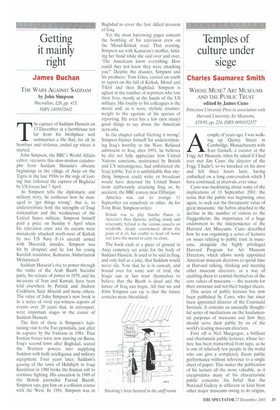Getting it mainly right
James Buchan
THE WARS AGAINST SADDAM by John Simpson Macmillan, 120, pp. 415, ISBN 1405032642 The capture of Saddam Hussein on 13 December at a farmhouse not far from his birthplace well summarises a life that, for all its bombast and violence, ended up where it started.
John Simpson, the BBC's World Affairs editor. recounts this slow-motion catastrophe from Saddam Hussein's obscure beginnings in the village of Awja on the Tigris in the late 1930s to the orgy of looting that followed the capture of Baghdad by US forces last 7 April.
As Simpson tells the diplomatic and military story, he confesses how he managed to 'get things wrong': that is, to underestimate both the strengths of Iraqi nationalism and the weaknesses of the United States military. Simpson himself paid a price on Sunday 6 April when his television crew and its escorts were mistakenly attacked north-west of Kirkuk by two US Navy F-14 aircraft armed with Maverick missiles. Simpson was hit by shrapnel and he lost his young Kurdish translator, Kamaran Abdurrazzak Mohammed.
Saddam Hussein's rise to power through the ranks of the Arab Baath Socialist party, his seizure of power in 1979, and his invasions of Iran and Kuwait, have been told elsewhere by Patrick and Andrew Cockburn, Said Aburish and many others. The value of John Simpson's new book is in a series of vivid eye-witness reports of events over 20 years that, in retrospect, were important stages in the career of Saddam Hussein, The first of these is Simpson's hairraising visit to the Fao peninsula, just after its capture by the Iranians in 1984. That Iranian forces were now moving on Basra, Iraq's second town after Baghdad, scared the Western powers into supplying Saddam with both intelligence and military equipment. Four years later, Saddam's gassing of the town of Halabjeh in Iraqi Kurdistan in 1988 broke the Iranian will to continue fighting. His execution in 1989 of the British journalist Farzad Bazoft, Simpson says, put him on a collision course with the West. In 1991, Simpson was in Baghdad to cover the first Allied invasion of Iraq.
Yet the most harrowing pages concern the bombing of his television crew on the Mosul-Kirkuk road. That evening, Simpson sat with Kamaran's mother, holding her hand while she said over and over, The Americans know everything. How could they not know they were attacking you?' Despite the disaster, Simpson and his producer, Tom Giles, carried on south to report on the fall of Kirkuk, Mosul and Tikrit and then Baghdad. Simpson is aghast at the number of reporters who lost their lives, mostly at the hands of the US military. His loyalty to his colleagues is the moral and, as it were, stylistic counterweight to the egotism of his species of reporting. He even has a few (not many) good things to say about the American networks.
In the chapter called 'Getting it wrong', Simpson blames himself for underestimating Iraq's hostility to the West. Refused admission to Iraq after 1991, he believes he did not fully appreciate how United Nations sanctions, maintained by British and US intransigence, had embittered the Iraqi public. Yet it is unthinkable that anything Simpson could write or broadcast would have deterred the United States from deliberately attacking Iraq or, by accident, the BBC convoy near Dibarjan.
America was out to avenge 11 September on somebody or other. As for Tony Blair. Simpson writes:
Britain was to play Sancho Panza to America's Don Quixote, puffing slowly and reluctantly behind in the various assaults on windmills, deeply unconvinced about the point of it all, but unable to head off home and leave the master to carry on alone.
The book ends at a piece of ground in Awja cemetery set aside for the body of Saddam Hussein. It used to be said in Iraq, and only half as a joke. that Saddam would never die. Now that he is in custody, and bound over for some sort of trial, the Iraqis can at last trust themselves to believe that the Baath is dead and the future of Iraq can begin. All that we and John Simpson can say is that the future contains more bloodshed.


























































 Previous page
Previous page